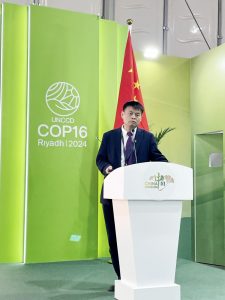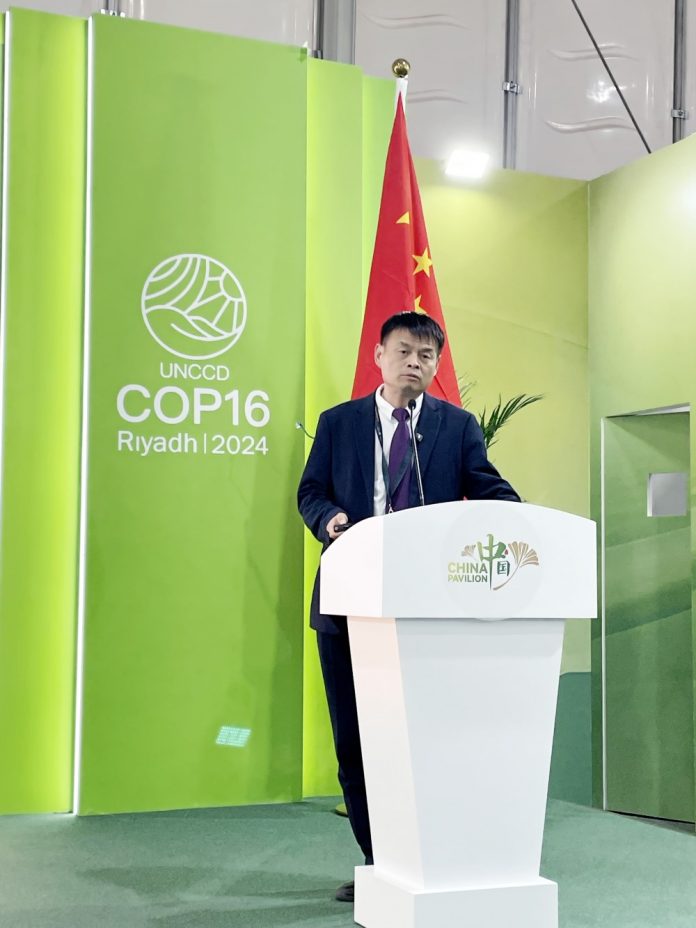[International Energy Network, Live Report] On December 11, a side event on “Technological Innovation for Eco-friendly Desert Photovoltaic Power Plants” was held at the China Pavilion of the 16th session of Conference of the Parties to the United Nations Convention to Combat Desertification (UNCCD) in Riyadh.
Wang Fuzhou, General Manager of Zhengzhou Zhengsai Shield Co., Ltd, delivered a speech titled “New Technology of Redundant Desertification Control” during the side event. Based on years of experience in desert governance, Wang Fuzhou shared three technologies for soil and water conservation and desertification control: innovative desertification control technology, innovative saline-alkali soil treatment technology, and rocky desertification control technology.

Innovative technology for desertification control can last for 100-year service life
In recent years, unreasonable human activities such as over-reclamation, overgrazing, deforestation, and irrational water resource utilization have led to forest destruction, severe land degradation, gradual aridification of the climate, and significant loss of desert water resources. These issues have continuously intensified desertification and increased the frequency of natural disasters such as sandstorms and windstorms. Desert governance is urgent.
To achieve sustainable development and turn deserts into oases, Zhengsai has introduced innovative desertification control technology. Wang Fuzhou cited the Zhengsai Geospatial Ecological Restoration Innovation Demonstration Base as an example to showcase the improvements in the Tengger Desert in Zhongwei.
According to Wang Fuzhou, after adopting Zhengsai’s redundant geospatial ecological restoration technology in 2023, the Tengger Desert in Zhongwei can now grow grass, trees, and various grains and vegetables. Notably, even in desert areas without rainfall, under conditions of purely groundwater drip irrigation and Zhengsai’s water retention technology, water usage can be reduced by 70%. Additionally, trials have proven that this technology for desert governance requires a one-time investment and has a lifespan of 100 years.
“If this technology can be widely promoted, it can increase the amount of grassland, forests, or fertile farmland in society. Therefore, Zhengsai’s geospatial ecological restoration technology has significant social and economic significance,” said Wang Fuzhou.
Innovative technology for saline-alkali land management can bring new vitality to wasteland
It is understood that saline-alkali soil is a serious type of soil pollution mainly caused by tidal erosion, poor hydrological conditions, human factors, and plant effects. To effectively prevent and control salinization, measures such as improving hydrological conditions, changing water sources, plant prevention, and soil improvement can be taken.
As a company that has long been committed to research on saline-alkali soil treatment technology, Zhengsai has introduced innovative saline-alkali soil treatment technology. Currently, this technology can efficiently and cost-effectively solve the problem of saline-alkali farmland with durability, providing hundreds of millions of mu of farmland for the country and serving national strategic security.
Wang Fuzhou cited the red mud saline-alkali soil improvement demonstration base as an example. He said that through the introduction of advanced saline-alkali soil improvement technology, the saline-alkali soil at the base has not only been comprehensively treated but also revitalized. The barren land has gradually transformed into fertile farmland, and abandoned farmland has regained vitality, successfully solving the long-standing problem of saline-alkali soil that has plagued local agriculture and ecological construction.
Successful trial of converting dry land on slope into paddy field in Guizhou
According to Wang Fuzhou, rocky desertification, also known as petrification or stone desertification, refers to the process of land degradation caused by continuous vegetation degradation or disappearance due to human factors, resulting in soil erosion, reduced land productivity, and large areas of bedrock exposed on the surface (or covered with rubble). It is the result of natural background factors such as geology, landform, climate, soil, and vegetation, as well as unreasonable human activities. Rocky desertification has become a major obstacle to sustainable development in some regions and urgently needs to be addressed.
It is understood that Zhengsai began research on rocky desertification control in 2011 and, after 12 years of continuous effort, achieved great success in a 200,000-mu project to convert dry slope farmland to paddy fields in rocky desertification areas in Guizhou in 2022.
The project involved a dry slope farmland in Guizhou, which was sandy and planned to be converted to paddy fields after land leveling. However, due to the poor water permeability of the sandy soil, it could not retain water, and various trials yielded unsatisfactory results. Zhengsai’s soil lithification technology was then used for testing, achieving water retention without leakage. The technology was recognized by the Guizhou Provincial Land and Resources Department and is now being applied on a large scale.
At the end of his speech, Wang Fuzhou said that as a result-oriented high-tech enterprise engaged in geospatial ecological restoration, Zhengsai not only demonstrates the rise of Chinese technology but also contributes Chinese wisdom to global environmental governance. On the future development path, Zhengsai will continue to uphold the spirit of scientific innovation, be guided by market demand, continuously promote technological research and development, and contribute to rural revitalization and ecological civilization construction.






